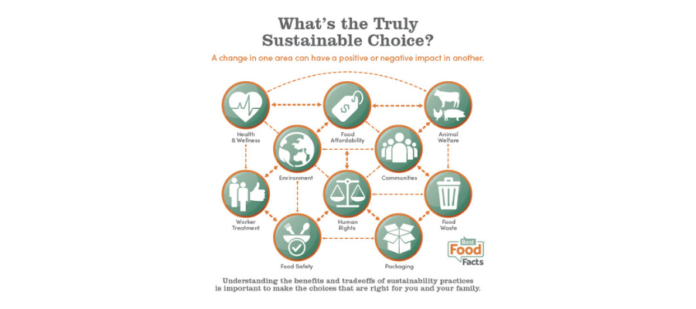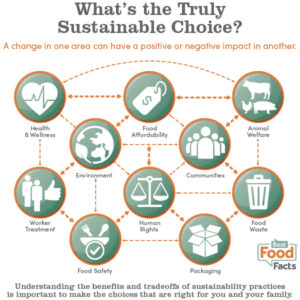
GLADSTONE, Mo. – Sept. 30, 2020 – The impacts of COVID-19 have shined a spotlight on sustainability in new ways, with consumer priorities shifting to the food supply chain and topics like food safety, worker safety and animal well-being. Sorting through complex issues to make the most sustainable decisions can be a challenge. However, a recent virtual event pairing online influencers, farmers and food experts demonstrates the power of transparent conversations to foster understanding of how sustainability decisions are made.
The BestFoodFacts.org Virtual Taste Tour, coordinated by The Center for Food Integrity (CFI), included three virtual discussions involving nine online influencers and 11 experts – farmers, registered dietitians, retailers, veterinarians and university scientists – who answered questions about the benefits and tradeoffs of sustainability decisions.
Pivotal Shifts
“Food producers are continually seeking ways to be more sustainable. Yet, a change that benefits one area of food production can have unintended consequences in another,” said CFI’s Amy te-Plate Church. “The influencers came away with a new appreciation for the relationships between sustainability attributes and the careful consideration that goes into each decision made by farmers and food producers.”
The food bloggers selected one of three topics:
- Sustainable food, covering the topics of food waste, fresh and processed foods, food ingredients, biotechnology and food affordability
- Sustainable egg farming, including animal health and welfare, hen housing and food affordability
- Sustainable crop farming, addressing crop practices, technology and precision agriculture, pesticide use, soil health and environmental stewardship
Experts provided several specific examples of how they weigh benefits and tradeoffs and the impacts of decisions around individual practices, products and processes. The conversations resulted in many pivotal takeaways for influencers.
“Speaking to the panel of experts, it was interesting to hear the different perspectives about what sustainability meant to them,” said Lisa Lin, of HealthyNibblesandBits.com. “Sustainable economies, leaving the earth better than what you started out with, implementing practices that keep the business going, the ability to grow food in a way that feeds everyone, protecting people and animals under our care, and meeting future and present food needs while leaving a minimal footprint.”
“After talking with Dr. MacDonald, my perceptions about processed foods have changed,” said influencer Rachael Yerkes with EazyPeazyMealz.com, referring to her discussion in the first virtual event with Dr. Ruth MacDonald, chair of the Department of Food Science and Human Nutrition at Iowa State University. “Processed foods play an important role in food sustainability. We waste a third of the food we produce, and if we can extend life, and make foods shelf stable, it can increase sustainability, and make food more affordable.”
The main takeaway for digital influencer Lisa Longley of WineandGlue.com regarding crop production was how farmers “are constantly striving to be on the cutting edge of technology and to have the most efficient ways of farming.”
One influencer expressed surprise that food companies have managers or entire departments devoted to sustainability efforts, and that broader food industry partnerships are underway.

Three Steps to Sustainable Decisions
With food and agriculture industries facing unprecedented pressure to navigate growing public expectations for a sustainable food supply, the stakes are high.
“A variety of organizations are harnessing the increased interest in sustainability to capture opportunity or promote a specific agenda by focusing on a single ingredient, process or practice without accounting for the potential impact on the entire food system,” said te-Plate Church. “That’s why these conversations about tradeoffs and benefits are so important and why decisions must be evaluated carefully.”
CFI recommends a three-prong approach to navigating sustainability decisions that are truly sustainable.
It begins with setting priorities based on an organization’s values and those of its stakeholders. Defining values provides a framework from which to make all decisions going forward. The second step is conducting a comprehensive assessment of the potential impacts – benefits and potential tradeoffs – of a recommended change on the organization, its supply chain and consumers.
“The first two steps lay a solid groundwork for the third, which includes effectively communicating your decisions to organizations that request change and to the public in a way that’s transparent and earns trust,” said te-Plate Church. “If you’ve done your research, you can confidently justify decisions that speak to overarching values like animal well-being, environmental stewardship, food safety or worker safety.”
The Best Food Facts Virtual Taste Tour demonstrates that engaging with consumers about sustainability decisions in farming and food can make a difference. In this particular instance, the nine influencers wrote blogs about their experiences, reaching a combined audience of over 10 million followers with nearly 800,000 views of the virtual tour videos. It speaks to the power of trusted, credible sources reaching the right audiences with the information they’re craving.
“It’s hard to know where to get your information from. It’s really nice to hear from people who are directly in the business,” said Cathy Trochelman of LemonTreeDwelling.com, “because that’s the perspective I believe I can trust.”
Learn more about the virtual tour at www.BestFoodFacts.org/
# # #
The Center for Food Integrity (CFI) is a not-for-profit organization that helps today’s food system earn consumer trust. CFI members and project partners, who represent the diversity of the food system, are committed to providing accurate information and working together to address important issues in food and agriculture. The Center does not lobby or advocate for individual companies or brands. For more information, visit www.foodintegrity.org.
Contact:
Jana McGuire
[email protected]
(402) 430-8723







